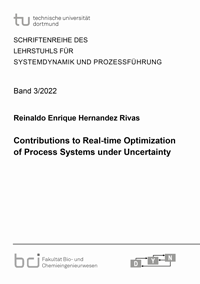
Shop : Details
Shop
Details
49,80 €ISBN 978-3-8440-8797-0Softcover262 pages87 figures389 g21 x 14,8 cmEnglishThesis
October 2022
Reinaldo Enrique Hernandez Rivas
Contributions to Real-time Optimization of Process Systems under Uncertainty
Real-time Optimization (RTO) has become the standard approach for improving plant performance in many petrochemical plants. In RTO, usually a first principle-based steady-state process model is used to formulate and solve a model-based optimization problem to compute the optimal operating conditions which maximize the economic performance of the plant while satisfying safety, process, and environmental constraints. However, despite its proclaimed benefits, the implementation of model-based online optimization is still limited to relatively few cases. One of the main reasons is the issue of model-plant mismatch: By using an inaccurate model, the computed operating point will be suboptimal and, in the worst scenario, the constraints can be violated.
This work attempts to overcome some of the difficulties that the process industry is currently facing in the deployment of RTO with inaccurate models. This contribution builds on the main idea of iterative correction of the nominal optimization problem with the estimated plant gradients according to the principle of Modifier Adaptation (MA) algorithm and provides several methodological contributions to overcome some of its limitations. First, trust-region optimization is combined with the traditional MA approach with the goal of ensuring convergence to the plant optimum under relatively mild assumptions regarding the properties of the available model. Second, a new algorithm is presented for those cases where in addition to model uncertainties, the plant measurements are contaminated with significant levels of noise. Third, two approaches to fast RTO are investigated to combine dynamic information with the available process model resulting in a faster convergence to the plant optimum. Experimental results in a miniplant for
This work attempts to overcome some of the difficulties that the process industry is currently facing in the deployment of RTO with inaccurate models. This contribution builds on the main idea of iterative correction of the nominal optimization problem with the estimated plant gradients according to the principle of Modifier Adaptation (MA) algorithm and provides several methodological contributions to overcome some of its limitations. First, trust-region optimization is combined with the traditional MA approach with the goal of ensuring convergence to the plant optimum under relatively mild assumptions regarding the properties of the available model. Second, a new algorithm is presented for those cases where in addition to model uncertainties, the plant measurements are contaminated with significant levels of noise. Third, two approaches to fast RTO are investigated to combine dynamic information with the available process model resulting in a faster convergence to the plant optimum. Experimental results in a miniplant for
Keywords: Real-time Optimization; Advanced Process Control; Process Optimization
Schriftenreihe des Lehrstuhls für Systemdynamik und Prozessführung
Edited by Prof. Dr.-Ing. Sebastian Engell, Dortmund
Volume 2022,3
Available online documents for this title
DOI 10.2370/9783844087970
You need Adobe Reader, to view these files. Here you will find a little help and information for downloading the PDF files.
Please note that the online documents cannot be printed or edited.
Please also see further information at: Help and Information.
Please also see further information at: Help and Information.
| Document |  | Document | ||
| Type |  | |||
| Costs |  | 37,35 € | ||
| Action |  | Purchase in obligation and download the file | ||
| Document |  | Table of contents | ||
| Type |  | |||
| Costs |  | free | ||
| Action |  | Download the file | ||
User settings for registered online customers (online documents)
You can change your address details here and access documents you have already ordered.
User
Not logged in
Export of bibliographic data
Shaker Verlag GmbH
Am Langen Graben 15a
52353 Düren
Germany
Am Langen Graben 15a
52353 Düren
Germany
Mon. - Thurs. 8:00 a.m. to 4:00 p.m.
Fri. 8:00 a.m. to 3:00 p.m.
Fri. 8:00 a.m. to 3:00 p.m.
Contact us. We will be happy to help you.



